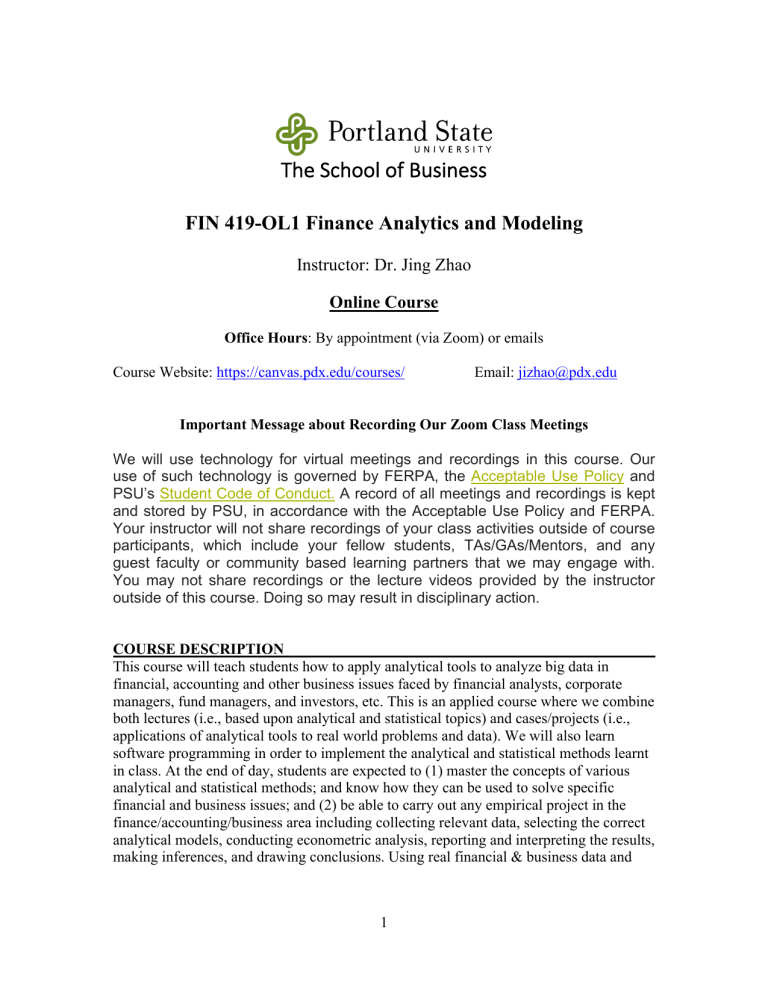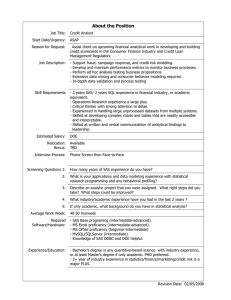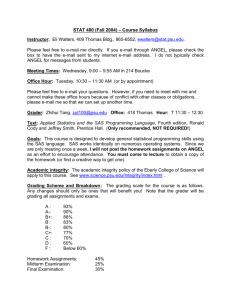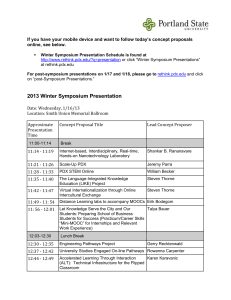
The School of Business FIN 419-OL1 Finance Analytics and Modeling Instructor: Dr. Jing Zhao Online Course Office Hours: By appointment (via Zoom) or emails Course Website: https://canvas.pdx.edu/courses/ Email: jizhao@pdx.edu Important Message about Recording Our Zoom Class Meetings We will use technology for virtual meetings and recordings in this course. Our use of such technology is governed by FERPA, the Acceptable Use Policy and PSU’s Student Code of Conduct. A record of all meetings and recordings is kept and stored by PSU, in accordance with the Acceptable Use Policy and FERPA. Your instructor will not share recordings of your class activities outside of course participants, which include your fellow students, TAs/GAs/Mentors, and any guest faculty or community based learning partners that we may engage with. You may not share recordings or the lecture videos provided by the instructor outside of this course. Doing so may result in disciplinary action. COURSE DESCRIPTION This course will teach students how to apply analytical tools to analyze big data in financial, accounting and other business issues faced by financial analysts, corporate managers, fund managers, and investors, etc. This is an applied course where we combine both lectures (i.e., based upon analytical and statistical topics) and cases/projects (i.e., applications of analytical tools to real world problems and data). We will also learn software programming in order to implement the analytical and statistical methods learnt in class. At the end of day, students are expected to (1) master the concepts of various analytical and statistical methods; and know how they can be used to solve specific financial and business issues; and (2) be able to carry out any empirical project in the finance/accounting/business area including collecting relevant data, selecting the correct analytical models, conducting econometric analysis, reporting and interpreting the results, making inferences, and drawing conclusions. Using real financial & business data and 1 problems, students have opportunities, for instance, to employ various market and macroeconomic information to predict future stock returns; examine the effects of antitakeover provisions on corporate innovation; analyze the influence of corporate social responsibility (CSR) ratings of a company and its market value; investigate the impacts of executive compensation and board governance on firm performance. The analytical/modeling topics included are: simple and multiple regression models, hypothesis testing and inferences, panel data regressions and other advanced topics such as endogeneity and sample selection. PRE-REQUISITE BA 303 COURSE OBJECTIVES This course is designed so that students are enabled to: • Explore and appreciate the critical role of financial analytics and statistics in managerial and investors’ problem-solving and strategic decision-making. • Master the concepts of various analytical and statistical methods; and know how they can be applied to solve specific financial and business issues using real world data. • Learn to conduct data analytics using statistical software • Learn to carry out any empirical project in the finance and business area including collecting relevant, real-world data, selecting correct analytical models, and conducting appropriate financial analyses. • Learn how to report and interpret analytical results, and make sound decisions. LEARNING OUTCOMES At the end of the course, student should be able to: • Analyze business issues, solve real world problems, and make informed, strategic financial/business decisions (Problem Solving & Critical Thinking). • Present, interpret, and communicate important information to interested audience (Communication). • Use statistical software to compute, analyze, graph, and present data and information (Technical Knowledge). • Apply concepts and theories from various areas in business to real world data and problems (Integrative Learning) • Explore various social, environmental and governance related policies and their impacts on firm value or performance (Sustainability) 2 COURSE MATERIALS Text Book: Title: Introductory Econometrics A Modern Approach Edition: 6th ed. (other versions are fine); Author: Jeffrey Wooldridge (ISBN: 978-1-305-27010-7) Articles: Additional readings including articles and academic papers will be provided by the instructor SAS Program: Available at the SB computer labs and for free installation on personal laptops at the University OIT help desk. Students can download and install the free University version of SAS through the SAS website: https://www.sas.com/en_us/software/university-edition.html Alternatively students may remotely access SAS software through PSU’s Virtual Lab: vlab.pdx.edu WRDS Class Account: Wharton business school of UPenn’s data service account for class - User name: fin4192022 Password: fin419summer2022 GRADING Final Exam Group Project & Presentation Assignments/Presentation: Total 40% 30% 30% 100% Final Exam: A final exam will be given at the end of the term, which is due roughly in 2 weeks from the date given. Specifically, it will be given at the beginning of week 7 and due at the end of week 8. This is a group exam, where each group should consist of 3 members and submit one solution with all group members’ names on it. This exam will be an openbook, open-notes, take-home exam based upon the textbook, lecture notes, assignments, and the computer lab exercises using SAS. Group Project & Presentation: Week 9&10 are scheduled for group project write-up & presentations. No lectures or other activities will be scheduled for these two weeks to better prepare students for project & presentation submission. Each group will submit via email the power point slides of team presentation of the project of about 15-20 minutes, along with a short, brief project paper (approximately 10 pages including exhibits and references etc., double spaced, 12 font). This project should begin as soon as possible and cover the entire term. Each team will identify/ask an interesting question in the area of economics, finance, accounting, management, and/or other businesses. Then students will do literature review on the question being posed, form hypotheses to be tested, collect and clean the data needed, conduct statistical/regression analyses, report and interpret their findings, and finally 3 draw conclusions in an empirical paper. Examples from prior students’ papers are available on Canvas “Week 9 & 10” folder for your reference. Assignments/Group Presentation: Three (3) assignments will be given over the term. One assignment is scheduled to be given in week 2, 4 and 5, and due at the end of week 3, 5 and 6 respectively. For each one of these assignments, four groups will be presenting their findings. Each presenting group is expected to submit a power point slide of their team presentation of 3-5 minutes. The rest of the class need to submit their individual analysis output via email. Students are graded primarily based upon their efforts rather than accuracy of their solutions, and will typically be assigned full credits for their assignment submissions. Please note the assignments are used to prepare students for the final exam and team project. Flexibility will be exercised. Important Dates: Final Exam Project Presentation Recording & Paper Three Group Assignments Due at the end of Week 8 (via email) Due at the end of Week 10 (via email) Due at the end of Week 3, 5 and 6 Academic Integrity: Each student is expected to honor and adhere to University’s standards of academic integrity, which can be found at http://www.pdx.edu/dos/academic-misconduct. Examples of academic misconduct include, but are not limited to cheating on an exam, copying the homework of someone else, submitting for credit work done by someone else (include plagiarism and paraphrasing without citing sources), stealing examinations or course materials, tampering with the University’s grade records, or with another student’s work, and knowingly and intentionally assisting another student in any of the above misconduct. ACCESS AND INCLUSION FOR STUDENTS WITH DISABILITIES PSU values diversity and inclusion; we are committed to fostering mutual respect and full participation for all students. My goal is to create a learning environment that is equitable, useable, inclusive, and welcoming. If any aspects of instruction or course design result in barriers to your inclusion or learning, please notify me. The Disability Resource Center (DRC) provides reasonable accommodations for students who encounter barriers in the learning environment. If you have, or think you may have, a disability that may affect your work in this class and feel you need accommodations, contact the Disability Resource Center to schedule an appointment and initiate a conversation about reasonable accommodations. The DRC 4 is located in 116 Smith Memorial Student Union, 503-725-4150, drc@pdx.edu, https://www.pdx.edu/drc. • • • • If you already have accommodations, please contact me to make sure that I have received a faculty notification letter and discuss your accommodations. Students who need accommodations for tests and quizzes are expected to schedule their tests to overlap with the time the class is taking the test. Please be aware that the accessible tables or chairs in the room should remain available for students who find that standard classroom seating is not useable. For information about emergency preparedness, please go to the Fire and Life Safety webpage(https://www.pdx.edu/environmental-health-safety/fire-and-lifesafety) for information. TITLE IX REPORTING OBLIGATIONS (incidents of sexual harassment and interpersonal violence) As an instructor, one of my responsibilities is to help create a safe learning environment for my students and for the campus as a whole. Please be aware that as a faculty member, I have the responsibility to report any instances of sexual harassment, sexual violence and/or other forms of prohibited discrimination. If you would rather share information about sexual harassment, sexual violence or discrimination to a confidential employee who does not have this reporting responsibility, you can find a list of those individuals. For more information about Title IX please complete the required student module Creating a Safe Campus in your D2L. Library Resources: Library resources are available through the D2L widget (on the lower right hand side of a D2L course site) and the library website at https://library.pdx.edu/ The library homepage provides easy access to books, journals, articles, and databases. Check out the Subject Guides or Course Guides for curated resources and research strategies on a topic or a course. Use Ask a Librarian (link on the upper right hand side of every library page) to contact us if you have any questions. Diversity Perspectives (Diversity of voice): Both the business environment, local community and our student population are becoming increasingly diverse. Thus it is of ample importance to adopt a broad and diverse set of views and recognize diverse voices in business and financial decision making. Where possible, this course will attempt to choose cases, readings, and data sources in analytics to reflect perspectives of women, minorities, cultural viewpoints, and other diverse populations. For instance, in one project, student will employ data on US corporations’ pro-diversity policies, that is, firm policies that promote women, minorities, the disabled, and LGBTQ as well as promoting an inclusive firm culture, and analyze how these pro-diversity policies will affect market valuation and innovative capacity of the companies. In addition, our reading list includes articles/cases written by woman and/or minority authors to reflect diverse perspectives and voices. 5 Diversity Engagement (Diversity of learning styles): Giving the changing demographics of our student population and local business community, we endeavor to provide culturally diverse and relevant approaches towards learning so as to foster student engagement and appreciation for diversity and inclusion. Our use of a variety of modalities of coursework preparation and deliverables allows students with a variety of learning styles and diverse backgrounds to be successful. Through the inclusion of diverse perspectives, examples, and learning activities, this course provides a space for all students to engage with concepts of diversity in business. The focus on inclusion and diversity is one of the core values of the School of Business and this course will provide a space for all perspectives and opinions. For example, this course requires student group projects on analytics. While accommodating students’ preferences, wherever possible, we will try to pair students with different backgrounds and learning styles. 6 Tentative Class Schedule* Part I: Regression Analysis with Cross-Sectional Data: Chapter 2: The Simple Regression Model (WK 1&2) Group Project & SAS Programming: Estimating Company’s Market Risk via CAPM and Predicting Future Stock Returns Introduction of WRDS database & Virtual Lab at PSU Assignment #1 is Given in Week 2 Chapter 3: Multiple Regression Analysis: Estimation (WK 3) Introduction of Data Source on WRDS for Multi-factors Data Assignment #1 is Due at End of Week 3 Chapter 4: Multiple Regression Analysis: Inference (WK 4) Group Project & SAS Programming: Estimating Fama-French Three-Factor Asset Pricing Model and Carhart Four-Factor Asset Pricing Model; Predicting Future Stock Returns Using Multi-factor Pricing Models Assignment #2 is Given in Week 4 Part II: Advanced Topics & Issues: Chapter 8: Heteroskedasticity (WK 5 & 6) Group Project & SAS Programming: Estimating Fama-French Three-Factor Asset Pricing Model and Carhart Four-Factor Asset Pricing Model; Predicting Future Stock Returns Using Multi-factor Pricing Models Under Heteroskedasticity Assignment #2 is Due at End of Week 5 Assignment #3 is Given in Week 5 Assignment #3 is Due at End of Week 6 Part IV: Preparation for Group Project: Chapter 1: The Nature of Econometrics and Economic Data (Students’ Own Readings) Chapter 19: Carrying Out an Empirical Project (Students’ Own Readings) *Subject to changes and adjustments without prior notice. WK 7&8 are the final exam weeks and WK 9&10 are the final team project weeks, respectively. 7



